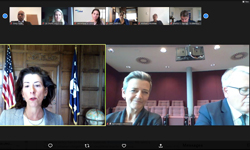BusinessEurope Headlines No. 2023-18
Social partnership: essential for a successful Europe

“In these challenging times for business and workers, our dialogue and cooperation at EU and national level is more crucial than ever”, said BusinessEurope Director General Markus J. Beyrer in an exchange with Esther Lynch, General Secretary of the European Trade Union Confederation (ETUC), during the ETUC's Congress held in Berlin on 23 May. He added that good steps have been taken in the last few years to strengthen the European social dialogue. Strengthening social partnership means to understand the realities of our partner, and vice versa, to find good ways to support each other and bring a useful contribution serving our respective interests as well as the prosperity of our societies. For Europe to overcome the current crisis stronger, a key priority is to improve the global competitiveness of European industry. On the labour markets, the key challenge for employers is to find the workers they need in good numbers and with the skills needed. Social partnership can be a strength for the continent to make steps in the right direction. The aim is to improve the conditions for doing business in Europe, which will also help create jobs and growth. This economic and social contract is at the core of the mission as social partners. It can make societies more stable and resilient. “We look forward to working with the ETUC in the next years to make Europe successful”, Beyrer concluded.
Contact: Cerutti Maxime
How trade policy can support European competitiveness
Trade can: help our economy increase resilience; create more market opportunities for European companies; improve security of supplies; help mitigate geopolitical risks. Watch our Director General Markus J. Beyrer explain and check our new paper.
EU-U.S. Talent for Growth Task Force: more productivity & competitiveness on both sides
 Access to a skilled workforce is vital for the productivity and competitiveness of companies. This was a key message from Markus J. Beyrer during the launch of the EU-U.S. Talent for Growth Taskforce on 17 May. The event had the participation of the Eurpean Commission Executive Vice-President for a Europe Fit for the Digital Age and Competition, Margrethe Vestager; European Commissioner for Jobs and Social Rights, Nicolas Schmit; and U.S. Secretary of Commerce, Gina Raimondo. He added that this includes the innovation potential of companies, which is a key element in adapting to greening and utilising the advantages that new technologies can bring. In the context of widespread labour and skills shortages and against a backdrop of the urgent need to up-skill and re-skill large parts of Europe’s workforce, it is important to exchange ideas and practices with our counterparts across the EU and in the USA on how to develop talent in our respective economies and labour markets. As part of this new cooperation, there can be strong added value for the EU in learning more about the US approach to strengthening cooperation between universities and employers, and the broader interplay between research, development and innovation.
Access to a skilled workforce is vital for the productivity and competitiveness of companies. This was a key message from Markus J. Beyrer during the launch of the EU-U.S. Talent for Growth Taskforce on 17 May. The event had the participation of the Eurpean Commission Executive Vice-President for a Europe Fit for the Digital Age and Competition, Margrethe Vestager; European Commissioner for Jobs and Social Rights, Nicolas Schmit; and U.S. Secretary of Commerce, Gina Raimondo. He added that this includes the innovation potential of companies, which is a key element in adapting to greening and utilising the advantages that new technologies can bring. In the context of widespread labour and skills shortages and against a backdrop of the urgent need to up-skill and re-skill large parts of Europe’s workforce, it is important to exchange ideas and practices with our counterparts across the EU and in the USA on how to develop talent in our respective economies and labour markets. As part of this new cooperation, there can be strong added value for the EU in learning more about the US approach to strengthening cooperation between universities and employers, and the broader interplay between research, development and innovation.
Contact: Cerutti Maxime
U.S.-EU Trade and Technology Council: business priorities for the 4th Ministerial
 Ahead of the May 30-31 EU-U.S. Trade and Technology Council (TTC) ministerial, BusinessEurope and the U.S. Chamber of Commerce identified 11 priorities we believe policy-makers should pursue. In the wake of Russia’s unconscionable invasion of Ukraine, the Covid-19 pandemic, and economic headwinds on both sides of the Atlantic, European and American companies need policies that reduce the regulatory burden of doing business and support continued investment and innovation. The TTC remains the most important platform for transatlantic economic cooperation, and it is important it delivers concrete outcomes ahead of next year’s elections in the European Union and the United States.
Ahead of the May 30-31 EU-U.S. Trade and Technology Council (TTC) ministerial, BusinessEurope and the U.S. Chamber of Commerce identified 11 priorities we believe policy-makers should pursue. In the wake of Russia’s unconscionable invasion of Ukraine, the Covid-19 pandemic, and economic headwinds on both sides of the Atlantic, European and American companies need policies that reduce the regulatory burden of doing business and support continued investment and innovation. The TTC remains the most important platform for transatlantic economic cooperation, and it is important it delivers concrete outcomes ahead of next year’s elections in the European Union and the United States.
![]() Contact: Eleonora Catella
Contact: Eleonora Catella
Critical Raw Materials Act: how to make it workable for business
 “The European Commission's ambitious initiative on the Critical Raw Materials (CRM) Act represents a good basis to make Europe more competitive, but further improvements are needed to make it workable for businesses”, BusinessEurope stated in its comments on the Critical Raw Materials Act. Setting maximum time limits for permitting and speeding up environmental impact assessments have the potential to accelerate the deployment of projects in Europe. At the same time, attention should also be directed to the legal acts that currently constitute an obstacle in the permit processes.
“The European Commission's ambitious initiative on the Critical Raw Materials (CRM) Act represents a good basis to make Europe more competitive, but further improvements are needed to make it workable for businesses”, BusinessEurope stated in its comments on the Critical Raw Materials Act. Setting maximum time limits for permitting and speeding up environmental impact assessments have the potential to accelerate the deployment of projects in Europe. At the same time, attention should also be directed to the legal acts that currently constitute an obstacle in the permit processes.
Now that the ball is in the court of the European Parliament and the Council, it is crucial to focus on some key issues of the proposal.
Although the impetus of the CRM Act is rightly set, to make it operable, stronger regulatory coherence is needed, and measures to remove barriers and stimulate further private investment throughout the value chain must follow. For BusinessEurope, it is also key to avoid administrative burden as much as possible, and it is necessary to fully protect trade and business secrets.
The EU should use and broaden its trade policies and instruments to gain greater access to critical raw materials. On the one hand, diplomacy should be used to conclude trade agreements and strategic partnerships for access to critical raw materials. On the other hand, instruments such as guarantees and loans should be used to support companies in obtaining the necessary critical raw materials.
![]() Contact: Daniele Olivieri
Contact: Daniele Olivieri
Calendar 
- 31 May: Fifth Annual Conference on Regulatory Scrutiny in the EU
- 6 June: Reuters Event: Responsible Business Europe 2023
- 14-15 June: International IP Enforcement Summit
- 19-20 June: TDI23 – Day of Industry
Not yet a subscriber? Register here.
Reminder: please have a look at our privacy policy